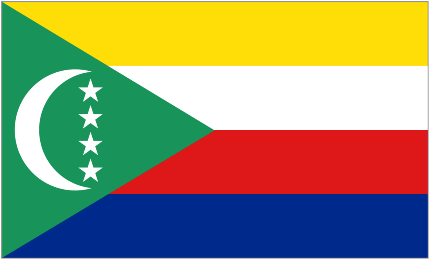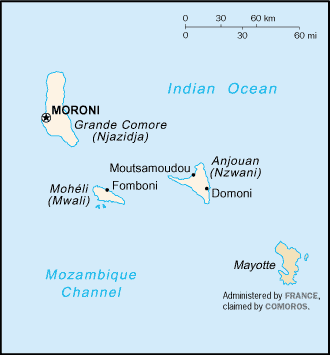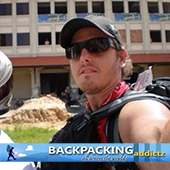- Population: 812,000 (UN, 2005)
- Capital: Moroni
- Area: 1,862 sq km (719 sq miles)
- Major languages: Arabic, French, Comoran (a blend of Swahili and Arabic)
- Major religion: Islam
- Life expectancy: 61 years (men), 65 years (women) (UN)
- Monetary unit: 1 Comoran franc = 100 centimes
Backpacking in Comoros
The Union of the Comoros is an archipelago ought to be known for culture and history, formed at the crossroads of civilizations, but it isn’t. It is shrouded to a degree of anonymity as its more controversial neighbours have lavished on the media hype, albeit infamous for conflict, having had twenty-five coups since 1975, when they gained independence from France. Comoros is home to a people who pride on culture that is as ornate, colourful, lively, and so sophisticated as their traditional clothing, or their flag. Rich, varied, and aromatic, 65% of the world’s perfume essence is produced by Comoros, ylang-ylang, jasmine, vanilla and spices as nutmeg, clove, and pepper. Thus, the island smells of its spices and perfumes further elaborating its beauty and the experience of being here.
The Comoros is a paradise-crumbled into islands, and is raw as paradise gets. This travel destination is a fascinating blend of Arabian mystique, Persian pride, Portuguese luxury, French flair, and African novelty that’s evolved to a Cloud Nine, not just the Cloud Coup-Coup-tag which it became infamous for. With an infrastructure that’s a far cry from an indulgent Cannes holiday of bikinis and booze, the tourism industry caters to adventure- and novelty- seekers who covets a crudely natural break from the madness and pace of the globalized world, and go back to one of a few wormholes left lost in time.
GEOGRAPHY
The Comoros (12 10 S, 44 15 E) make up a group of four major islands of a total 2,235 km2 set on the Indian Ocean – Ngazidja, Mwali, Nzwani, and Maore. This happens to be one of the smallest countries in the world. The islands are volcanic and the terrain, mainly rugged caused by hills and mountains. Le Karthala (2,360 m) isthe highest point of Comoros and the world’s largest active volcano. Its last activity in 2005 damaged and wiped out villages. On a positive note, volcanic soil rendered 35.87% of arable land.
CLIMATE
The climate is a mild tropical or tropical marine. Thus, Comoros essentially has two seasons: wet season, from December through April, and dry season, from May to November. Rather tricky is that the wet season holds the hottest month of the year, March, while the dry season is cool overall, as temperatures average at 19 °C.
PEOPLE
The Comorans tot up at an estimate of 773,407, at the latest statistics of 2010 making it among the least populated countries, but densely populated at the same time. The majority of the Comorans are of African–Arab descent, while a minority of white Africans with French, British, Portuguese, and Dutch ancestry also make-up the population. Antalote, Cafre, Makoa, Oimatsaha, and Sakalava are the major Comoran ethnic groups in existence.
LANGUAGE
The local vernacular and most common official language is COMORIAN (also SHIKOMORO), a language related to Swahili and Arabic that has four more variants for each of the four major islands of the country. FRENCH and ARABIC are the official languages of Comoros, the former, the formal language of education by reason of French colonization, while the latter as the language of the Quran. However, in Mayotte or Maore, French is the sole official language.
RELIGION
That said Sunni Islam is the dominant religion representing 98% of the total population, while only 2% are Christians of mainly Roman Catholic belief, particularly in Maore.
ATTRACTIONS
Truly, the volcanic Comoros archipelago is quite an interesting place. The volcanic property of the islands gives the islands extra character, texture, and colour. Every hue of the colour family stands out. Everything grows and flows among this igneous backdrop of gray and black. Its digressed state makes the place rather quaint and charming, as the people here are. Among the things to expect in Comoros are the amazing beaches and coastlines sums up paradise effortlessly. The Grand Comore could be the place for nature-lovers who appreciate a good ole hike, for this is where Le Karthala stands, noting then and again that this is the largest active volcano in the world – “ACTIVE” but beautiful nonetheless. Moroni is the capital with undeniable Arab inspiration, but not the best bit of Comoros, to say the least. To say the most, the traveller will come across some unmanaged waste and sub-standard transport, but it still could be the ultimate destination for some people…some but not all.
While Moroni has the Arabian thing going on, the contested island of Mayotte has French written all over it, as it is still a part of France and 95% population prefers it that way. Mayotte is the spoiled one in the lot, indeed far luxe and comfortable. There’s less of the ubiquitous African corruption that plagues most African nations, and it has got just the whitest beaches. Ladies, don’t pull out your bikinis just about anywhere. This may be approved in the French Mayotte, however as with most Muslim countries, it is valuable advice to enjoy the beaches covered up, because when some Comorans stare, they glare.
Comoros, if you’re not familiar, is a land of prohibitions and the traveller may be held by the police for a passport check, and detained if without it, or any other unwritten and unspoken violation. In Mayotte, it’s always going to be interesting to ride this replica of a 6th century BC Phoenician ship used for the first circumnavigation of Africa. When everything gets too dull, there will always be water sports of sorts.
“Worth for your money” is a superfluous concept. When the price is not right, blame local government, blame rural development. Things will always be ridiculously more expensive than the traveller will expect from that quaint diner to that charming shop. Finding worthy accommodation to satisfy at least “cleanliness” standards is a feat so great as even a 1-star accommodation will cost the traveller. As said, this tiny country is not for everybody. Comoros may be too small, too poor, but all too amazing and safe. People here are dirt poor, hence the needed support from tourists, but trust that Comorans won’t rip, rob, or rape.
FOOD
Comoran cuisine is delightful and virtually unheard of. Comoran cuisine is a melting pot of Swahili, Indian, indigenous, and French food-styles. The food is delectable from the Swahili-inspired coconut milk-based fish and meat curries, samosas, grilled meats, and the French colonial legacy, the baguette. The freshly-baked baguette is unbelievable ideal for any kind of sandwich, that take sliced hard-boiled egg, tomato, and cucumbers and stuff it in there dressed with mayo as vendors do in Comoran stalls, it becomes phenomenal and unparalleled street grub. Some local foods may be an acquired taste like the sour bread or cake served with the curries. The tuber manioc is also eccentric-tasting. But the seafood is unbelievably delicious like their crazy lobsters.
Tap water equals volcanic spring water. For an impoverished country that sells only French bottled water, this is a good thing. Beat that! No need for an expensive bottle of Evian. Alcohol is mainly a no-no, but heeding the call of tourism, some Chinese and Indian merchants sell South African beer and French wine. Don’t be surprised if they hand it in a black bag.
***






Leave A Response